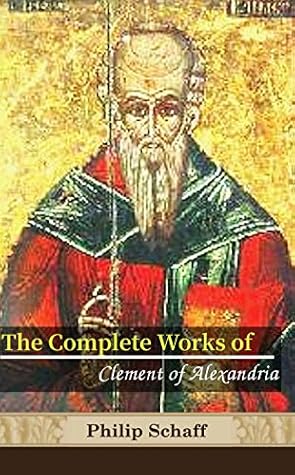- Bible
- Read the Bible
- Bible Versions
- Verse of the Day
- Reading Plans
- Verses by Topic
- Books of the Bible
- Bible Images
- Study
- Commentaries
- Concordances
- Dictionaries
- Encyclopedias
- Sermons
- Bible Atlas & Maps
- BP Wiki
- Devotionals
- Today's Devotionals
- Light of the World
- All Devotionals
- Inspirational Quotes
- More
- Picture Quotes
- Videos
- Inspirational
- Bible Study
- What The Bible Says
- Bible Q&As
- Daily Bread
- Bible by Genre
- Bible Stories
- Random Bible Verse
- Community
- Store
The Complete Works of Clement of Alexandria
by Clement of Alexandria
Clement of Alexandria (150 - 215), was a Christian theologian and philosopher who founded the Catechetical School of Alexandria. He was a convert to Christianity who was highly educated, familiar with classical Greek philosophy and literature. As his works demonstrate, Clement was influenced by Hellenistic philosophy, more than any other Christian thinker of his time, and most of all by Plato and the Stoics. Among his students were Origen and Alexander of Jerusalem.
Clement is usually regarded as a Church Father. He is venerated as a saint through-out the Orthodox world and in the Anglican church. Formerly he was revered in the Catholic church, but his name was removed from the Roman Martyrology in 1586.
This collection of his writings includes:
1) Exhortation To The Heathen
2) The Stromata, Or Miscellanies
3) The Instructor
4) Who Is The Rich Man That Shall Be Saved?
Bible references are linked to their corresponding chapter, and Philip Schaff's footnotes are included.
Clement is usually regarded as a Church Father. He is venerated as a saint through-out the Orthodox world and in the Anglican church. Formerly he was revered in the Catholic church, but his name was removed from the Roman Martyrology in 1586.
This collection of his writings includes:
1) Exhortation To The Heathen
2) The Stromata, Or Miscellanies
3) The Instructor
4) Who Is The Rich Man That Shall Be Saved?
Bible references are linked to their corresponding chapter, and Philip Schaff's footnotes are included.
BUY NOW
Kindle Edition, 2456 pages
Published January 22nd 2020
© 2025 Bibleportal.com All rights reserved.

His parents were pagans, and Clement was a convert to Christianity. In the Protrepticus he displays an extensive knowledge of Greek mythology and mystery religions, which could only have arisen from the practise of his family's religion.
Having rejected paganism as a young man due to its perceived moral corruption, he travelled in Greece, Asia Minor, Palestine and Egypt. Clement's journeys were primarily a religious undertaking. In Greece, he encountered an Ionian theologian, who has been identified as Athenagoras of Athens; while in the east, he was taught by an Assyrian, sometimes identified with Tatian, and a Jew, who was possibly Theophilus of Caesarea.
In around 180, Clement reached Alexandria, where he met Pantaenus, who taught at the Catechetical School of Alexandria. Eusebius suggests that Pantaenus was the head of the school, but it is controversial whether the institutions of the school were formalized in this way before the time of Origen. Proponents of a formalized leadership and succession suggest that Clement succeeded Pantaenus as leader of the school, and was succeeded himself by Origen. Clement studied under Pantaenus, and was ordained to the priesthood by Pope Julian before 189. Otherwise, virtually nothing is known of Clement's life in Alexandria. He may have been married, a conjecture supported by his writings. Clement's diet is also unknown, but he said some things that look down upon eating flesh such as, "It is good...neither to eat flesh" and that even the fumes from cooked flesh "darken the soul"; however he said non-vegetarians aren't sinning except in certain circumstances such as those who eat flesh with "gluttony" and he was not opposed to all instances of eating meat.
During the Severian persecutions of 202–203, Clement left Alexandria. In 211, Alexander of Jerusalem wrote a letter commending him to the Church of Antioch, which may imply that Clement was living in in Cappadocia at that time. The date and location of his death are unknown.... Show more